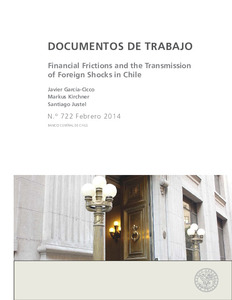Por favor, use este identificador para citar o enlazar este ítem:
https://repositorio.uca.edu.ar/handle/123456789/15035| Título: | Financial frictions and the transmission of foreign shocks in Chile | Autor: | Kirchner, Markus Justel, Santiago García Cicco, Javier |
Palabras clave: | Chile; ECONOMIA; CRISIS ECONOMICA | Fecha de publicación: | 2014 | Editorial: | Banco Central de Chile | Cita: | García Cicco, J., Kirchner, M., Justel, S. Financial frictions and the transmission of foreign shocks in Chile [en línea]. Documentos de Trabajo del Banco Central de Chile. 2014, 772 Disponible en: https://repositorio.uca.edu.ar/handle/123456789/15035 | Resumen: | Abstract: We set up and estimate a DSGE model of a small open economy to assess the role of domestic
financial frictions in propagating foreign shocks. In particular, the model features two types of
financial frictions: one in the relationship between depositors and banks (following Gertler and
Karadi, 2011) and the other between banks and borrowers (along the lines of Bernanke et al, 1999).
We use Chilean data to estimate the model, following a Bayesian approach. We find that the
presence of financial frictions increases the importance of foreign shocks in explaining consumption,
inflation, the policy rate, the real exchange rate and the trade balance. In contrast, under financial
frictions the role of these foreign shocks in explaining output and investment is somehow reduced.
The behavior of the real exchange rate and its interaction with the financial frictions is key to
understand the results. Resumen: Se desarrolla y estima un modelo dinámico y estocástico de equilibrio general de una una economía pequeña y abierta para estudiar el rol de fricciones financieras domésticas en propagar shocks externos. En particular, el modelo incluye dos tipos de fricciones: una en la relación entre depositantes y bancos (siguiendo a Gertler y Karadi, 2011) y otra entre los bancos y los deudores (siguiendo a Bernanke et al, 1999). Se utiliza datos de Chile para estimar el modelo, siguiendo un enfoque Bayesiano. Se encuentra que la presencia de fricciones financieras aumenta la importancia de shocks externos para explicar el comportamiento del consumo, la inflación, la tasa de política monetaria, el tipo de cambio real y la balanza comercial. Por otro lado, con la presencia de fricciones financieras los shocks externos parecen menos importantes en explicar la evolución del producto y la inversión. Finalmente, se enfatiza el comportamiento del tipo de cambio real y su interacción con las fricciones financieras para interpretar estos resultados. |
URI: | https://repositorio.uca.edu.ar/handle/123456789/15035 | Disciplina: | ECONOMIA | Derechos: | Acceso abierto | Fuente: | Documentos de Trabajo del Banco Central de Chile. 2014, 772 |
| Aparece en las colecciones: | Artículos |
Ficheros en este ítem:
| Fichero | Descripción | Tamaño | Formato | |
|---|---|---|---|---|
| financial-frictions.pdf | 929,15 kB | Adobe PDF |  Visualizar/Abrir |
Visualizaciones de página(s)
69
comprobado en 27-abr-2024
Descarga(s)
34
comprobado en 27-abr-2024
Google ScholarTM
Ver en Google Scholar
Este ítem está sujeto a una Licencia Creative Commons

